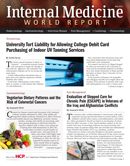Publication
Article
Internal Medicine World Report
Neuropathy Risk Increased for Celiac Disease Patients
Author(s):
Risk for neuropathy is increased for patients with celiac disease, according to research published in JAMA.

Patients with celiac disease — sensitivity to gluten – have increased risks of neuropathy, according to findings published in JAMA.
Researchers from the Karolinska Institutet in Stockholm, Sweden collected the data from small intestine biopsies conducted between June 1969 and February 2008 to examine the relative risk and absolute risk of developing neuropathy in patients with biopsy verified celiac disease. The researchers compared the risk of neuropathy in 28,232 celiac disease patients to 139,473 control individuals.
For celiac disease patients, there was a 2.5 fold increased risk of neuropathy, the researchers determined. There were 198 individuals who were indentified that had celiac disease and a later diagnosis of neuropathy (which accounted for 0.7%), compared to 359 control patients with a later diagnosis of neuropathy (only 0.3%).
“We found an increased risk of neuropathy in patients with celiac disease that persists after celiac disease diagnosis,” the authors wrote. “Although absolute risks for neuropathy are low, celiac disease is a potentially treatable condition with a young age of onset. Our findings suggest that screening could be beneficial in patients with neuropathy.”
The researchers extrapolated from the data that the absolute risk of developing neuropathy was 64 per 100,000 person years in patients with celiac disease and 15 per 100,000 person years in the control group.
The authors also said that there were no differences between men and women for the risk of neuropathy in patients with celiac disease. Finally, the researchers commented that patients with neuropathy should be screened for celiac disease.
Previous research on celiac disease and neuropathy has not been successful due to obstacles such as the use of inpatient data, low study power, and lack of neuropathic characteristics. However, research that has been conducted, such as a study presented at the 2015 annual meeting of the American Academy of Neurology in Washington, DC, suggested that a gluten free diet may alleviate many celiac disease symptoms. Another study published in PLOS One implied that a patient’s extent of physical recovery from celiac disease would not affect the patient’s long term risk for developing atrial fibrillation.
Various factors, such as sex, maternal celiac disease, and type 1 diabetes status are associated with the development of celiac disease in children, according to a recent study published in the journal Clinical Gastroenterology and Hepatology.






